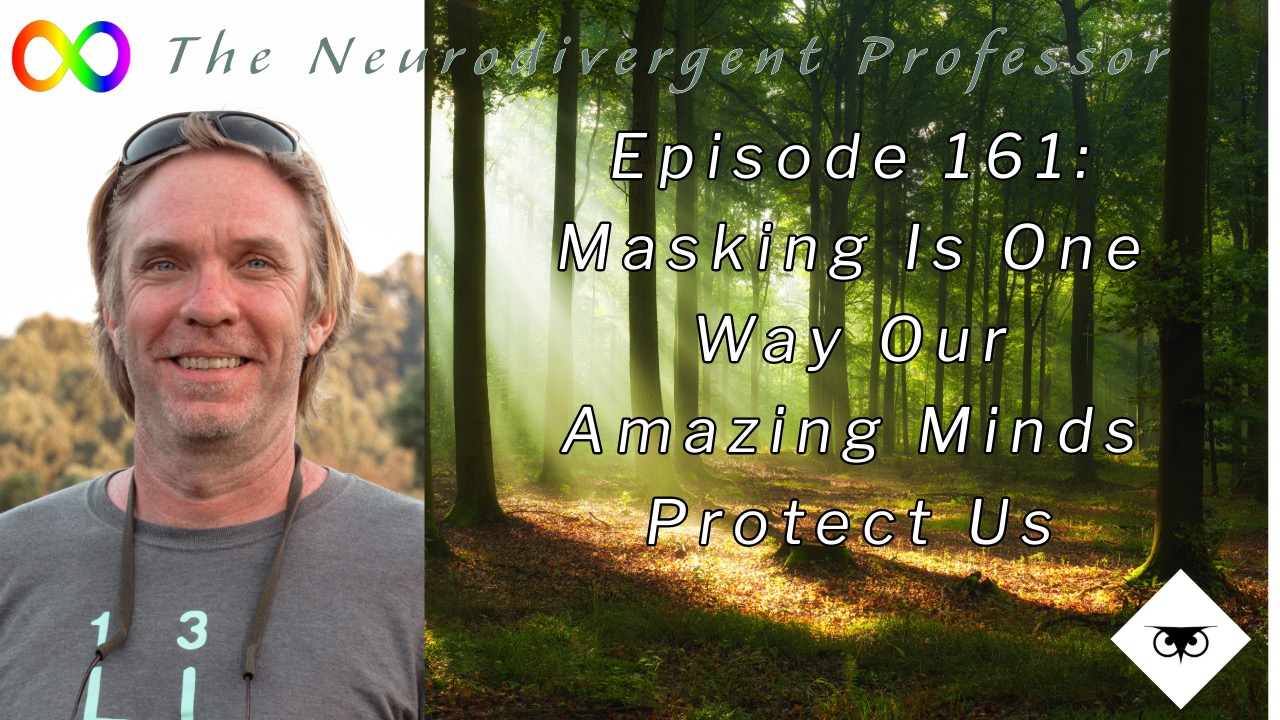But can lead to bigger problems if misunderstood.

How do you feel about terms like,
- people pleaser
- codependent
- inauthentic
- chameleon
We use these terms to describe when we are not ‘being ourselves’ in the presence of other people.
This phenomenon reminds me of a quote attributed to comedian Chris Rock:
When you meet somebody for the first time, you’re not meeting them, you’re meeting their representative.
So this isn’t something I’m making up, it’s in the human vernacular. It is a thing that we humans do when interacting.
I think this probably has some evolutionary significance in ensuring we remain members of a group. We are being polite and trying not to hurt feelings or cause conflict. We want to be liked.
The neurodivergent community uses terms like ‘masking’ or ‘camouflaging’ to describe this behavior. Autistic people mask to hide behaviors that may identify them as autistic. Similarly, allistic or neurotypical people mask when they try to avoid conflict or blend in.
Regardless of what you call it, we all mask to some degree.
My experience with masking began in therapy where I was identified as codependent. According to psychoanalysis, I mask all the time so that people will like me and to avoid conflict. I was given tools to help change my mind and beliefs, but I couldn’t let go of my desire to keep the peace.
Later I would experience Internal Family Systems (IFS) therapy where I learned I had ‘parts’ who protected me. One, or more, of these parts were related to my need to avoid conflict and blend in. I learned at a young age that ‘being myself’ often invited ridicule from my peers and made me feel unsafe. I learned to mask to feel safe in the world.
Pretty cool that our brains can protect us like this.
Unfortunately, we humans tend to repeat what works and I became a master masker. I learned that my brain works like this. If I feel unsafe I will perform a behavior or role that worked in the past to make me feel safe. Reducing my personality, or masking, and blending in more with the person with whom I was interacting or was afraid, accomplished this need for safety.
As a result, I repeated these masking behaviors whenever I felt unsafe and became a master masker.
I think the IFS model makes a lot of sense and I have met many of the parts that help protect me. The problem is, that these masking behaviors also reduce our growth. Especially when we become adults and can protect ourselves in other ways or when the bullies of our youth are gone.
It is easy to overdevelop masking tendencies. Like a muscle, the more we use them the stronger and more pervasive they become. The more we mask the less comfortable we are being ourselves. We start to become the masks we wear. Eventually, it is easy to lose track of who is you and who is a mask.
I believe a lot of us suffer from this identity crisis. We forget who we are because we spend so much time being someone else.
Where do we draw the line?
Masking is protective, of that, there is no doubt. Personally masking probably saved me from getting beat up more than once. It also enabled me to learn critical life skills like public speaking, interviewing for jobs, and maintaining relationships.
But somewhere along the line, I lost myself. I realized I had done so when therapists would ask me what I wanted or what I needed. I honestly didn’t know. I didn’t know what I wanted or needed because I didn’t know who I was.
As sad or weird as that may sound I think it is incredibly common. I think we learn to rely on our masks to get through our days. In doing so, we strengthen them and rely on them. It becomes subconscious. We are not aware of what we are doing.
In the background of our lives, beneath the level of our awareness, our masks become stronger. As they do, our ‘selves’ become weaker. We become more afraid of revealing who we are and more convinced that doing so would cause trouble.
In biology, we call this a negative feedback loop.
A protective behavior or signal stops an undesired reaction. In doing so, the behavior or signal becomes stronger and we maintain balance in our bodies. This homeostasis is critical to our survival, thus the importance of the behavior or signal is enhanced.
Humans do not want to feel unsafe so we learn to mask when interacting with other humans. Masking helps us maintain homeostasis for safety, so we continue to mask. Masking moves us away from negative unsafe conditions and keeps us in a balanced mode of safety.
The key, then, is to moderate our use of masks. To do this we must first be aware that we are masking. I have learned to do this through a meditation practice. There are probably other ways, but I will focus future articles and episodes on how a practice is essential; especially for neurodivergent people.
For now, I just wanted to share my thoughts about how awesome masking can be and remove some of the stigma associated with what many refer to as people-pleasing. Interestingly, too much of a good thing can become a bad thing. The secret is being aware.
I release podcast and YouTube versions of new episodes every Thursday. I share articles on medium weekly-ish. Please follow along or subscribe if you are part of this community.
Podcast streaming audio:
https://www.buzzsprout.com/530563/14360953
YouTube video:
Discover more from Revolutionizing human evolution
Subscribe to get the latest posts sent to your email.

